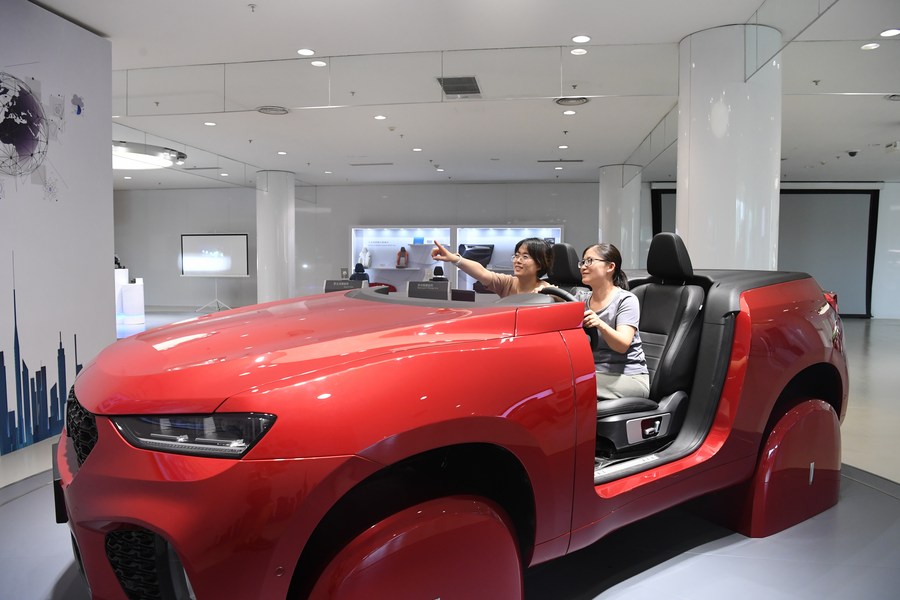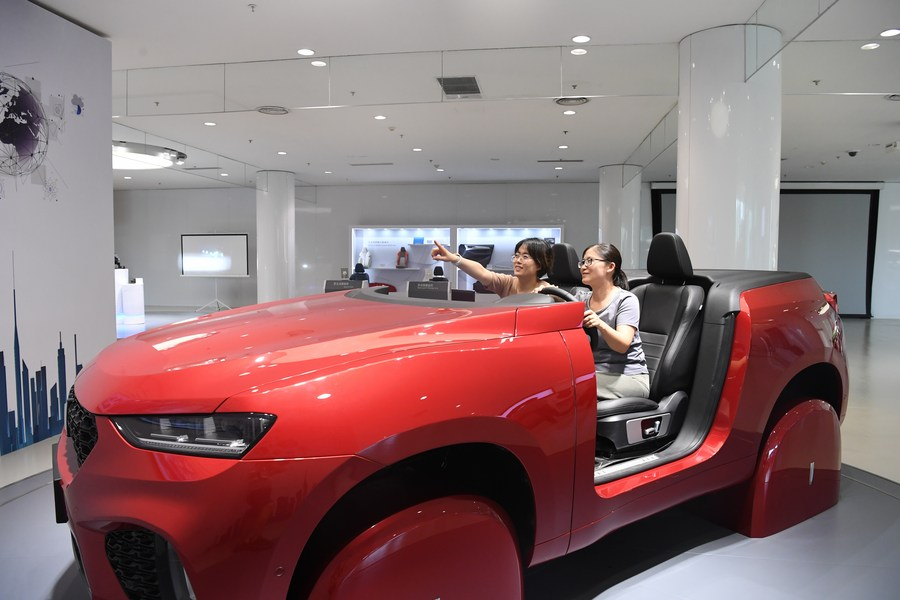
Visitors try 5G-based intelligent driving technology at the Haval technology center of Great Wall Motor (GWM) in Baoding, north China's Hebei Province, July 15, 2021.(Xinhua/Zhu Xudong)
BEIJING, Nov. 17 (Xinhua) -- Great Wall Motors (GWM), a major automobile manufacturer of China, announced on Monday that the company would deliver a batch of freshly produced hybrid vehicles to its Thai clients in this week. Apart from GWM, other Chinese new energy vehicle (NEV) makers, including BYD, Hozon Auto and Aiways, are also expanding their presence in Southeast Asia, expecting new development in the market full of potential.
-- Chinese pioneers in Southeast Asia
GMW's hybrid products to be delivered this week were manufactured in its Rayong factory in Thailand, which has already produced 10,000 NEVs. The new NEV model was welcomed in Thai market as local buyers snapped up 1,000 units in just 40 minutes.
"The first year of GMW's Thai factory has witnessed steady growth in manufacturing, sales and operation, and more importantly, the brand has been embraced and trusted by local consumers," said Zhang Jiaming, president of GWM's ASEAN operations, adding that the company will pace up to expand in Southeast Asia with its Thai operation as an example. According to the company's global strategy, it will target at the markets of Malaysia, Vietnam, the Philippines and Singapore after it settles in Thailand, Brunei, Laos and Myanmar.
The Southeast Asian market, with full potential, has been a popular destination for Chinese NEV pioneers. BYD, one of China's leading NEV manufacturers, earlier signed a distribution agreement with Sime Darby Motors Malaysia on new energy passenger vehicle sales in Malaysian market.
Hozon Auto's Neta V model right-hand-drive (RHD) version recently debuted on Thai market, representing the first high-tech NEV model entering Thai market. Hozon Auto has also been listed in Laos and operated in Myanmar. It's learned that the company will gradually enter the NEV market of Southeast Asia with Thailand as a hub.
Aiways, an electric-vehicle startup, has also embarked on its journey to Southeast Asia, as it recently entered a cooperation agreement with Verge Auto, a Singapore service provider with resources of over 5,000 distributors across Southeast Asia.
-- Localization a common focus
A major highlight in these Chinese NEV "going global" pioneers' journey in Southeast Asia is their focus on localization.
GWM bought a local manufacturing plant in Rayong, Thailand, from its previous owner of U.S. carmaker General Motors, and upgraded it to an assembly line for NEVs with production capacity of 80,000 units per year. This heavyweight acquisition reflects GWM's intention to realize localized manufacturing in Thailand.
Apart from localized manufacturing, Chinese companies also value localized design, research and development (R&D) of NEVs, rolling out RHD versions for local customers. According to Aiways Vice President Li Hui, the company has invited southeast Asian users to try new models and give feedbacks. Thanks to their feedback, the company made special design for the air-conditioning system to enhance its function, as they found local users often lower the temperature for many times in a continuous manner.
Chinese NEV makers also boost local NEV development by building charging facilities. It is learned that GWM has launched a G-Charge Supercharging Station in Bangkok, providing Thai users with 7/24 charging services. Aiways is also building charging network in Laos.
-- Bright future ahead
China's auto market remains the world's largest and Chinese auto industry is the most dynamic stage across the globe, said Fu Bingfeng, secretary general of the China Association of Automobile Manufacturers (CAAM), adding that China and Southeast Asian countries could embrace a bright future in terms of cooperation in the auto industry, especially in the field of NEV.
The Southeast Asia has a natural attraction to Chinese NEV firms, where the economy is rather stable and the culture there is close to Chinese culture, said Xu Haidong, deputy chief engineer of the CAAM, and proposed that Chinese automakers can pilot their products first in south China, where the natural environment is very similar with that of Southeast Asia, before entering into the overseas market.
Analysts of the auto industry predicted that blessed with its potential, the auto market of Southeast Asia would be a huge one with annual production and sales of two million units to three million units, which represents a strategic market worth intensive development by Chinese firms.
For example, Thailand, with the auto industry as its pillar industry, has unveiled a slew of measures to encourage NEV consumption and favorable policies, in terms of tax, tariff and government subsidies, to attract global NEV makers to invest there.
By 2030, zero-emission vehicles will take a share of 30 percent in vehicle production in Thailand, and by 2035, all Thai-made vehicles will be zero-emission vehicles, according to the country's electric vehicle plan, said Donlaporn Ajavavarakula, Director of Thailand Board of Investment Shanghai Office, in an interview.
(Edited by Li Shimeng with Xinhua Silk Road, lishimeng@xinhua.org)




 A single purchase
A single purchase









